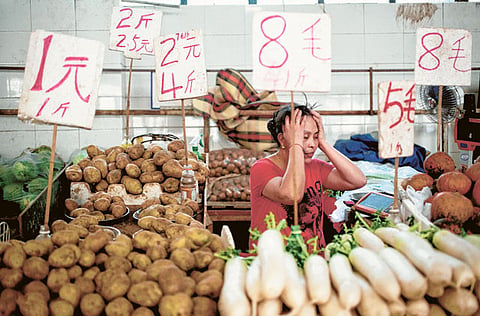China’s inflation pressures ease as commodity prices slide
The central bank has freed up cheap long-term funding for banks

Beijing: China’s inflation moderated in December as the government took measures to boost supplies of commodities and cracked down on speculation, and food prices fell.
The producer price index rose 10.3 per cent from a year earlier, slowing from November’s 12.9 per cent and below economists’ forecasts of a 11.3 per cent gain. The consumer price index increased 1.5 per cent, down from 2.3 per centt in November and lower than a projected 1.7 per cent gain.
For the full year, factory gate prices rose 8.1 per cent, while consumer prices increased 0.9 per cent.
The economy started losing momentum in recent months as commodity prices surged, the property market slumped and repeated virus outbreaks disrupted travel and spending. Authorities have shifted to a more pro-growth bias this year, fueling expectations the central bank could cut its key policy interest rate for the first time since April 2020, possibly as early as next week.
Cheap funding
The central bank has already freed up cheap long-term funding for banks, while the government has brought forward debt sales in an attempt to speed up fiscal spending.
The government took a number of measures recently to curb sharply rising energy and raw materials prices, with signs they could be having a desired effect. However, the emergence of omicron-variant virus cases is likely to be a defining factor in coming weeks, given that China is the world’s biggest producer and consumer of raw materials. If the outbreak continues to spread, some supply-side disruptions could ensue.
Consumer inflation remained subdued as virus control measures impeded consumption and weighed on demand, especially for prices of services. Core CPI, which excludes more volatile food and energy prices, rose 1.2 per cent, the same as in November.
Food prices fell in December, with vegetable price gains slowing. The spread of the more transmissible omicron variant threatens to temporarily drive prices up again if strict mobility restrictions are widened. The upcoming Lunar New Year holidays will also see a surge in demand for staple foods and thus higher prices.
Economists expect consumer prices to grow 2.2 per cent in 2022, and factory-gate prices to gain 4 per cent for the full year, according to the median estimates in a Bloomberg survey.


